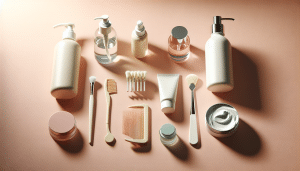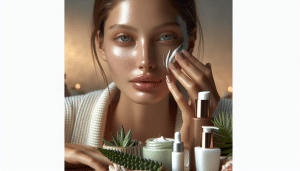Unlock Radiant Skin by Mastering Everyday Habits
Natalie Brooks October 27, 2025
Curious about how small changes in your daily routine might transform your skin’s natural glow? Dive into the world of radiant skin care, where hydration, balanced nutrition, and stress management work in harmony to reveal a luminous complexion.
The Role of Daily Hydration for Radiant Skin
Daily hydration stands as a powerful ally for anyone wishing to enhance their skin’s natural radiance. Proper water intake is not only vital for overall health but also uniquely important for maintaining skin elasticity and a clear, glowing complexion. When the body is hydrated, the skin’s outermost layers retain a balanced moisture barrier, making dullness less likely to occur. Sufficient fluid intake helps the skin look plumper and reduces the appearance of fine lines, which many people notice in their journey to luminous skin. While topical moisturizers are helpful, many find that the glow truly starts from within, where water works to flush toxins and transport vital nutrients to skin cells. Sources underscore the positive impact of hydration on skin clarity and resilience (https://www.ncbi.nlm.nih.gov/pmc/articles/PMC4529263/).
The link between water consumption and skin health is often explored by dermatologists, who emphasize internal hydration as the foundation for external beauty. Individuals may not always notice the subtle symptoms of dehydration, such as dryness, tightness, or an uneven tone, but these issues can be reversed with mindful fluid intake. Hydration requirements differ from person to person, depending on climate, activity, and age, but most experts recommend consuming water in regular intervals rather than all at once. Herbal teas and foods rich in water, like cucumber and watermelon, can complement daily fluid goals. The result? Softer, more luminous, and resilient skin that resists environmental stressors—no fancy treatments required.
Curiosity may lead some to ask if hydration alone can completely revitalize tired or aging skin. The truth is, while water won’t erase years overnight, staying well-hydrated can create a visible foundation of health. Paired with a balanced lifestyle and protective skincare, water helps retain cell structure and encourages a consistently dewy appearance. Many people report smoother makeup application and even skin tone, simply by adding a water bottle to their morning routine. While the myth of ‘eight glasses a day’ persists, tuning into individual thirst cues remains the best guide for long-term hydration, according to medical sources (https://www.cdc.gov/healthyweight/healthy_eating/water-and-health.html).
Nutrition Strategies to Boost Your Natural Glow
The pursuit of radiant skin often leads to the kitchen. Nutrition plays a central role in the wellness and beauty space, with nutrient-dense foods fueling cellular repair and promoting a more luminous complexion. Antioxidants—like vitamins C and E—are vital in fighting free radicals, which can contribute to premature aging and loss of radiance. Omega-3 fatty acids, found in flaxseeds and salmon, help maintain the lipid barrier that keeps skin supple and hydrated. Dermatology experts consistently highlight how whole foods, particularly colorful fruits and vegetables, can enhance both skin tone and texture (https://www.hsph.harvard.edu/nutritionsource/antioxidants/).
Collagen, the protein responsible for skin firmness, responds particularly well to nutrition-rich diets. Foods high in vitamin C, such as oranges, bell peppers, and strawberries, support the body’s natural collagen production, making the skin feel springy and smooth. Zinc and selenium, minerals found in nuts and seeds, play their own vital roles by encouraging the repair of skin tissues and controlling inflammation. Rather than focusing on one magic food, balanced meals that incorporate a wide variety of suitable nutrients tend to deliver the most visible and lasting results for skin health. Some specialists even recommend integrating fermented foods for their probiotic benefits, supporting both the digestive system and overall skin wellness.
Curious individuals may sometimes ask about superfoods or supplements for beauty, but research continues to favor whole-food approaches. Over-supplementation can sometimes cause imbalances that appear on the skin. Nutritionists instead suggest a colorful plate and mindful eating as the best strategy for a glowing complexion over time. Regular, balanced meals rich in leafy greens, lean proteins, and healthy fats contribute to improvements not only in skin health but in energy and mental clarity. Documented cases find that those who consistently include skincare-friendly foods in their routine report better moisture, fewer breakouts, and a naturally radiant appearance (https://www.niaid.nih.gov/diseases-conditions/nutrition-and-immune-system).
Protecting Skin from Environmental Stressors
Environmental exposure can greatly influence the way skin looks and feels over time. From sun exposure and pollution to indoor heating and harsh winds, external stressors drain the skin’s natural resources and may cause premature signs of aging. Daily sunscreen use is widely recognized as a cornerstone habit for defending against harmful ultraviolet rays that can accelerate the breakdown of collagen and lead to uneven pigmentation. Dermatological guidance consistently encourages the use of broad-spectrum sunscreen—even on cloudy days—for proactive skin defense (https://www.fda.gov/drugs/information-consumers-and-patients-drugs/sunscreens-and-sun-safety-q).
Aside from sunlight, air pollution is now understood to be a significant contributor to skin dullness and irritation. Environmental toxins, such as particulate matter and heavy metals in urban air, can penetrate the skin’s barrier and ignite oxidative stress. Antioxidant-rich moisturizers and gentle cleansers are helpful companions in fighting these effects. Evening routines that focus on gentle cleansing and occasional exfoliation are recommended for removing impurities that block skin vibrancy. Paying attention to air quality or investing in simple indoor purifiers can further assist those seeking an extra boost in their skincare arsenal.
Indoor environments, particularly during colder seasons, may also pose moisture challenges for the skin. Central heating systems lower humidity in the air, quickly leading to dry and irritated skin. Using a humidifier and choosing barrier-enhancing creams can help retain more moisture throughout the day and night. It’s helpful to consider fabrics in daily wear—opting for soft, breathable textures that cause less friction. Wellness routines rooted in prevention, protection, and gentle restoration offer some of the best pathways for sustaining a radiant complexion regardless of the environment.
Mindfulness and Stress Reduction in Skin Health
In the world of wellness and beauty, stress is more than just a mental burden—it’s also a visible adversary to skin radiance. The body’s stress response, when unmanaged, can fuel inflammatory reactions that manifest as acne, redness, or even eczema flare-ups. Mindfulness techniques, such as gentle breathing, meditation, or yoga, are increasingly cited as tools that help manage cortisol levels, thus reducing potential triggers for dull or irritated skin. Research links mindfulness not only to relaxation but also to a heightened sense of well-being reflected in a healthier complexion (https://www.ncbi.nlm.nih.gov/pmc/articles/PMC6134740/).
Many individuals notice positive shifts after incorporating simple relaxation or self-care rituals. These can be as easy as taking a few moments for deep breathing, progressive muscle relaxation, or even a soothing bath with calming essential oils. Studies have shown that regular mindfulness practice can positively affect sleep, mood, and skin clarity. The mind-skin connection is not to be overlooked; prioritizing a calm mindset helps support the skin’s natural ability to restore itself overnight, revealing a brighter and more refreshed appearance by morning.
Embracing small, repeatable habits around stress management may inspire big changes in beauty routines. For those who find it difficult to start meditating, activities like mindful walking or journaling can offer similar benefits. Reducing screen exposure before bed is another method often linked to improved skin tone and quality of sleep. Over time, a stress-aware lifestyle helps create resilient, glowing skin, encouraging individuals to approach both wellness and beauty as holistic, interconnected goals for daily living.
Building Consistent Skincare Rituals for Results
Natural radiance does not appear by chance. Rather, it is the result of consistent skincare rituals that nurture, protect, and enhance the skin’s abilities to renew. Establishing a basic but regular routine—comprising cleansing, moisturizing, and sun protection—lays the groundwork for visible results. Adding steps tailored to unique skin needs, such as serums for pigmentation or night creams with gentle exfoliants, further boosts cellular renewal and smoothness. Dermatologists advocate for gentle, regular care over sporadic or aggressive treatment methods to maintain healthy skin (https://www.aad.org/public/everyday-care/skin-care-basics/care).
Skincare does not need to be elaborate to be effective. Simplicity and consistency often outperform complicated regimens filled with numerous products. Choosing items that match your unique skin type—whether dry, oily, sensitive, or combination—makes a significant difference. Also, tracking subtle changes after introducing new products can help fine-tune routines for optimal results. Morning and evening habits anchored in self-care foster not just healthier skin, but a more mindful approach to personal well-being overall. Journaling progress is a growing trend that helps many celebrate small milestones.
When new concerns arise—such as sudden sensitivity, breakouts, or persistent dryness—consulting a qualified dermatologist or medical professional is always advised. With the overwhelming information available, expert input helps filter out myths and ensures routines stay both effective and safe. A steady approach, rooted in evidence and sustainability, ensures that daily beauty isn’t just fleeting. Glowing skin gradually becomes a reflection of holistic health and self-awareness, proving that wellness and beauty are intimately linked and accessible through consistent habits.
Sleep and Nighttime Repair Processes
Sleep, often overlooked, is a cornerstone of both wellness and beauty for the skin. Overnight, the body initiates deep repair processes—healing microdamage, refreshing skin cells, and regulating moisture levels. While sleeping, blood flow to the skin increases, supporting nutrient delivery and waste removal. Good quality sleep is closely associated with fewer wrinkles, reduced puffiness, and an even tone. Experts recommend prioritizing both duration and quality by creating relaxing evening routines and avoiding screen time before bed (https://www.sleepfoundation.org/physical-health/skin-health).
Setting up gentle nighttime rituals is an effective way to support sleep-driven skin rejuvenation. Popular steps include using nourishing creams, sleeping on silk pillowcases to minimize friction, and creating a calming environment with soft lighting and soothing scents. Some people discover that keeping a regular sleep schedule helps skin adapt to the body’s circadian rhythms, maximizing the restorative window overnight. Medical evidence highlights how inadequate sleep can increase cortisol production and disrupt the skin barrier, making routine sleep hygiene an important beauty practice.
Research consistently links healthy sleep with radiant complexions. Lack of sleep makes the skin appear tired, increases the risk of breakouts, and slows natural repair. Conversely, those who make rest a priority often enjoy enhanced glow, softer textures, and robust resilience against daily stressors. Embracing mindful, evidence-based sleep habits not only supports overall wellness but reinforces all other efforts made in hydration, nutrition, and self-care—offering a complete pathway to radiant and resilient skin.
References
1. Palma, L., et al. (2015). The Role of Water Intake in the Maintenance of Skin Hydration. Retrieved from https://www.ncbi.nlm.nih.gov/pmc/articles/PMC4529263/
2. Centers for Disease Control and Prevention. (n.d.). Water and Healthier Drinks. Retrieved from https://www.cdc.gov/healthyweight/healthy_eating/water-and-health.html
3. Harvard T.H. Chan School of Public Health. (n.d.). Antioxidants. Retrieved from https://www.hsph.harvard.edu/nutritionsource/antioxidants/
4. National Institute of Allergy and Infectious Diseases. (n.d.). Nutrition and the Immune System. Retrieved from https://www.niaid.nih.gov/diseases-conditions/nutrition-and-immune-system
5. US Food & Drug Administration. (n.d.). Sunscreens and Sun Safety Q&A. Retrieved from https://www.fda.gov/drugs/information-consumers-and-patients-drugs/sunscreens-and-sun-safety-q
6. Sleep Foundation. (n.d.). Skin Health and Sleep. Retrieved from https://www.sleepfoundation.org/physical-health/skin-health








